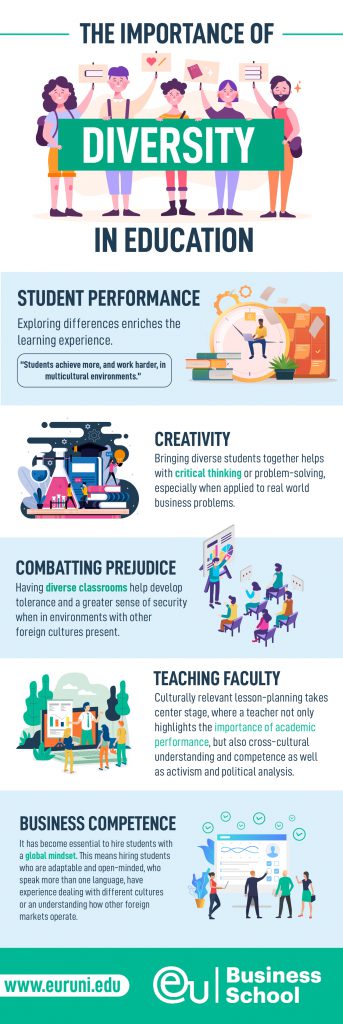Diversity is generally understood to encompass race, ethnicity, class, gender, sexuality, age, and political and religious beliefs. And while in the past it has focused on strengthening inter-cultural tolerance, new ideas about diversity and inclusion have developed, shifting the focus towards enriching human learning and experience, so-called ‘unity in diversity.’
When it comes to education, ‘unity in diversity’ in the classroom doesn’t seem a farfetched idea anymore for any globally minded teacher. This can be accomplished by either having technology that connects students with foreign knowledge and cultures or by having an international student body to make the learning environment multicultural and diverse.
Student Performance
Exploring differences enriches the learning experience. Studies have demonstrated that fostering diversity in the classroom has a huge impact on student performance. According to research conducted by Queens University of Charlotte, students achieve more, and work harder, in multicultural environments. Also, when lesson plans reflect the students and their varied backgrounds, they develop a deeper knowledge of a subject as they explore it from varying perspectives. This equips students with a broader understanding and opens their minds to deeper insights.
Creativity
Diverse study environments also drive creativity when interpreting and using knowledge, data and facts. Group activities with diverse group members helps create a positive atmosphere and group dynamic for creative and collaborative learning. Bringing diverse students together helps with critical thinking or problem-solving, especially when applied to real world business problems.
Combatting Prejudice
Studies have shown that having diverse classrooms help develop tolerance and a greater sense of security when in environments with other foreign cultures present. It also helps students learn about other languages and cultures, encouraging them to be interculturally sensitive.
Teaching Faculty
Diversity is as important among faculty as it is among students. Educational institutions are increasingly hiring teachers from a range of backgrounds. This helps students identify with teachers who then structure their lessons to reflect differences among students. Culturally relevant lesson-planning takes center stage, where a teacher not only highlights the importance of academic performance, but also cross-cultural understanding and competence as well as activism and political analysis.
Business Competence
Since the goal of many businesses is to grow and expand on an international scale, it has become essential to hire students with a global mindset. This means hiring students who are adaptable and open-minded, who speak more than one language, have experience dealing with different cultures or an understanding how other foreign markets operate.
The stages of educational development, from primary school to university, should prepare students for entering the workforce and experiencing an increasingly globalized work environment. It only makes sense that teaching embraces these realities that come with being part of diverse schools, communities and even countries.
At EU Business School we take the commitment to diversity very seriously and that is why we are proud to have been ranked as the worldwide education leader in diversity by QS Global MBA Rankings 2020, achieving 100/100 in the areas of international faculty, student nationalities and gender balance.
With a student body comprised on more than 100 nationalities and students speaking on average more than three languages, we are proud to be setting the benchmark for multicultural schooling environments globally and preparing our students for successful international business careers.













